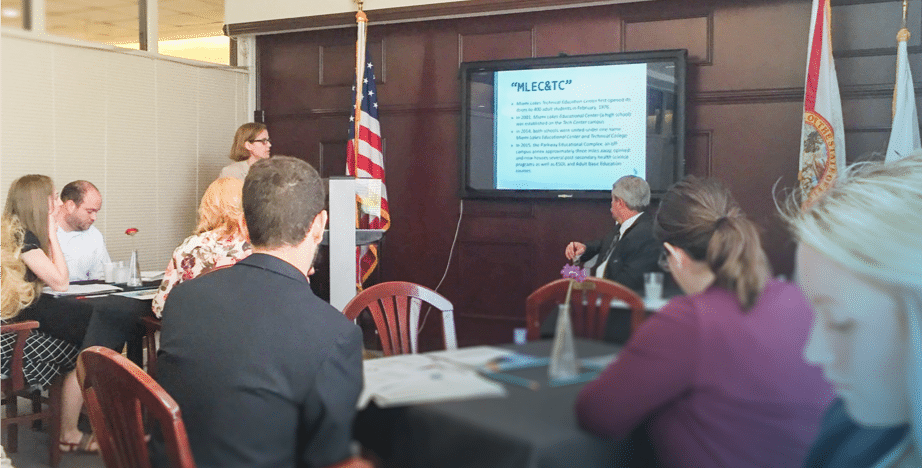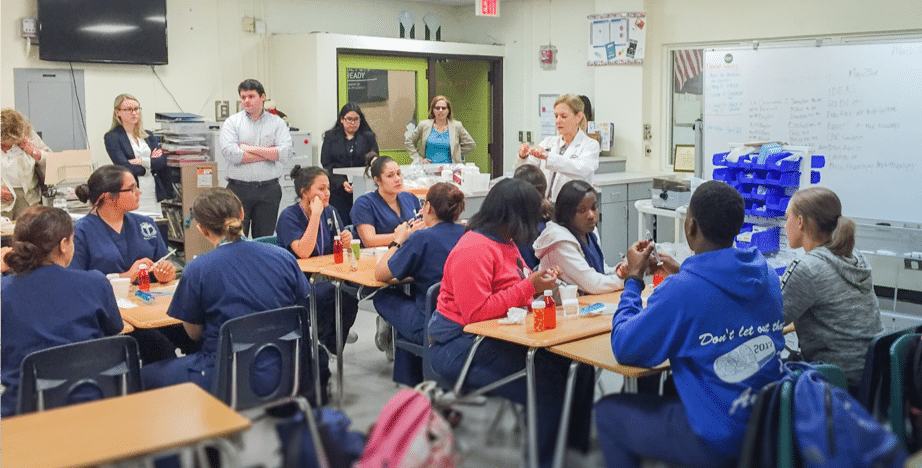Overview
By the time students enter high school, many have already fallen behind in critical subject areas such as English and mathematics. Educators can use early warning indicators to target interventions for students at risk of failing or dropping out. By addressing mathematics and literacy deficiencies, educators improve the chances of at-risk students remaining in school, and graduating on time.
This forum, part of the series on “Improving the Transition from Middle Grades to High Schools,” details the work of Alabama’s Reading Initiative Project for Adolescent Literacy (ARI-PAL) and Virginia’s Algebra Readiness Initiative (ARI). Both initiatives are geared towards improving fundamental academic skills so that students successfully transition from the middle grades to high school.
More information on the Alabama Reading Initiative Project for Adolescent Literacy (ARI-PAL) program can be found at: ftp://ftp.alsde.edu/documents/50/ARI-PAL%20Maiden%20Voyage_10-2007.pdf
More information on Virginia’s Algebra Readiness Initiative can be found at: http://www.doe virginia.gov/
Forum Highlights
Sherrill Parris, Assistant State Superintendent of Education, Alabama Department of Education, opened the forum by discussing the funding of the ARI-PAL aimed at improving adolescent literacy. In 2004, Alabama policymakers decided to temporarily halt expansion of ARI-PAL in order to reallocate resources and fully fund Kindergarten through 3rd grade. While funding was only allocated for grades K-3, Parris stated, “If you can show that you can make a legitimate difference in K-3, you can have almost anything.”
Parris explained that by avoiding unfunded mandates and making participation voluntary, schools are motivated to participate and succeed using ARI-PAL recommendations. Teachers and staff are trained using professional development and weekly support. Furthermore, school districts also provide financial support and are committed to implementing essential components of ARI-PAL. Although state funding focused on grade K-3 implementation, a grant from the National Governors Association provided needed funds to implement the ARI-PAL in grades 4-8. Furthermore, federal funding provided needed dollars to include supplemental professional development in addition to the existing professional development for teachers and staff.
Parris continued to discuss the current funding proposal that has been submitted to the state legislature to increase funding by 15 million dollars to support more professional development as well as district coaches, literacy coaches, and intervention teachers. The increase in funding is based partially on the fact that Alabama youth showed the highest improvement on the 2007 National Assessment of Educational Progress (NAEP) in 4th grade reading. Not only was this a drastic change, it was the largest gain by any state in the history of the NAEP. Parris asserted, “We think reading is the key, but it’s not everything. But it has to be the first thing.”
Dr. Linda M. Wallinger, Assistant Superintendent for Instruction, Virginia Department of Education, explained that Virginia’s Algebra Readiness Initiative (ARI) was a response to the 1997 change in high school graduation requirements for a Standard Diploma that requires all students to complete Algebra I or above in mathematics. Math intervention services are targeted at students in grades 6, 7, 8, and 9 who may not be able to complete the new requirements. To identify these students who are in danger of failing the Algebra I end-of-course-test, individual student performance on the Algebra Readiness Diagnostic Test (ARDT) is used. Furthermore, early warning indicators are used to identify students for services in grades 6 through 9 who:
- Have been unsuccessful in previous intervention and/or remediation programs; and/or
- Have had below average performance in the previous year’s mathematics program; and/or
- Did not pass the Standards of Learning mathematics assessment test.
Ninety-five percent of schools in Virginia are participating in the Algebra Readiness Initiative and most school divisions utilize the ARDT when they accept funding for the intervention. The computer-adaptive test assesses the knowledge and skills of the Mathematics Standards of Learning ranging from grade 3 through grade 8 in Algebra I. In addition, assessments of ARDT results can be monitored by staff in the Department of Education in order to analyze progress.
In terms of funding, the ARDT is offered free to localities and the ARI funding is based on the funding formula determined by the percent of 7th and 8th grade students who qualify for the federal free lunch program. Wallinger explained that localities are also required to match funds based upon the composite index of local ability-to-pay. Wallinger reiterated that although the federal funding formula for free lunch program students is used, the instructional interventions and ARDT are available to all students.
Wallinger commented that schools have shown statewide gains at the targeted grade levels. On the 8th grade test, 81% passed in school year 2004-2005. In contrast, only 68% passed in 2000-2001 (pre-ARI). Furthermore, in school year 2006-2007, 92% (18% gain) of students passed the Algebra I end-of-course test while only 74% passed in school year 2000-2001.
Wallinger emphasized that additional mathematics interventions in middle school are still needed. With new mathematics assessments being given in all grades, performance in grades 6 and 7 has been low. Efforts are now focused on grade 6 and 7 instruction to ensure that students will be able to succeed once they transition to high school. In addition to other transition efforts, a new high school course entitled, “Algebra, Functions, and Data Analysis,” has been designed to serve as a transition course to help more students take and succeed in Algebra II.
Highlights from the Question and Answer session
A participant requested more information on some of the specific elements of ARI-PAL. Parris explained that daily 90-minute reading blocks are supplemented by additional time to ensure comprehension. In addition, content area teachers collaborate to develop specific strategies to help students before, during, and after school.
A question was posed regarding how reading equivalency is evaluated for students that are behind. Parris asserted, “We can’t be happy with just a year’s gain. These students need to make even greater gains with more than just the 90-minute block. You have to make a choice on what you will not do with them, and give them more time in reading intervention.”
Presenters
Mrs. Sherrill W. Parris is an Assistant State Superintendent of Education for the Alabama Department of Education. From 1998 to 2007, Mrs. Parris served as the administrator of the highly successful Alabama Reading Initiative. In 1997 she served on the Alabama Reading Panel, a group of professionals from the business community and from education who worked together to develop the Alabama Reading Initiative which has grown from 16 schools in 1998 to its current 907 schools. The Alabama Reading Initiative is a K-12 comprehensive strategy to bring the best research on reading instruction and the best teaching practices to classrooms in Alabama. Mrs. Parris’s focus is clearly centered on literacy, and her goal remains to make all Alabama’s children successful readers.
Sherrill Parris received her undergraduate degree from Auburn University. She received her master’s degree in Elementary Education and her Ed. S in Elementary Education and the Principalship from Livingston University (University of West Alabama). Her professional career began as a social worker with Foster Family Care and Adoption at the United Methodist Children’s Home in Selma, Alabama. In 1979 she began work with her life’s passion, education. After 14 years in the classroom in both the private and public sector, Ms. Parris assumed the responsibility of administrator and became a principal with Selma City Schools in Alabama. Her work within the local school system was the springboard to directing her passion toward all of Alabama’s children.
Dr. Linda M. Wallinger is Assistant Superintendent for Instruction at the Virginia Department of Education, working with elementary, middle, and high school instruction; and Virginia’s grant from the National Governors Association to establish STEM centers. Prior to her service at the department, she was a high school French teacher and a middle school administrator. Dr. Wallinger holds degrees in French and educational policy from The College of William and Mary as well as a M.Ed. in school administration from the University of Virginia.
At the Department of Education, Dr. Wallinger has worked on numerous projects for the General Assembly and the Board of Education. She works closely with the Governor’s office to accomplish Governor Kaine’s educational goals, especially those related to preschool education, literacy, and STEM (Science, Technology, Engineering, and Mathematics). She has also published a number of refereed journal articles and edited a book on topics related to foreign language education and school leadership.
Dr. Linda Wallinger Powerpoint: Virginia’s Algebra Readiness Initiative»
Sherrill Parris: Alabama Reading Initiative Powerpoint – Improving Adolescent Literacy»
Sherrill Parris
Assistant State Superintendent of Education
Alabama Reading Initiative
P.O. Box 302101
Montgomery, Alabama 36130
334-353-1389
Dr. Linda M. Wallinger
Assistant Superintendent for Instruction
Virginia Department of Education
VA Algebra Readiness Initiative
101 N 14th St
Richmond, VA 23219
804-225-2034



